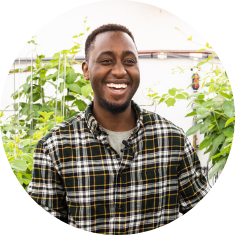
Deus Mugabe
Role: HQP Scholar
Degree: PhD
Primary Faculty Advisor: Istvan Rajcan
Project: Genomic Analysis of Sclerotinia Stem Rot (caused by Sclerotinia sclerotiorum) Resistance in Canadian Soybean Germplasm
Department: Department of Plant Agriculture, OAC
What inspired you to pursue your current degree?
My whole career in plant agriculture was largely influenced by growing up around food insecurity. After completing a Bachelor of Science in Agriculture, I worked in the field for a while and realized that I wanted to become a researcher who works on improving crops through breeding and genetics. I had the opportunity to do a master’s degree in this area which gave me a good foundation, but I knew that a Ph.D. would provide me with the expertise required to conduct independent and more refined research— thus, pursuing the degree.
What about your research area excites you?
Plant breeding and genetics research are both very applied and have an artistic twist to them, which I enjoy. At its core, my research area seeks to create an improved version of a crop in response to a set of presented challenges. Understanding the underlying genetic mechanisms explaining the improvement is equally important because there may be trade-offs involved. For example, the genetics associated with high yield in a soybean variety may also be associated with susceptibility to one or more diseases in the crop. So, the breeder’s job involves a lot of playing around with different combinations of characteristics. I find this requirement for constant creativity in solving problems exciting.
What challenges do you find in your research, and how do you try to overcome them?
I work with white mould – a soybean disease that is highly unpredictable which can be exciting because it is constantly throwing me new puzzles but can also be challenging due to uncertainty. I have a very helpful advisory committee which I make sure to use when I am completely stuck. I also often seek mentorship from senior graduate researchers who provide different perspectives and help break down the puzzles to make progress.
How would you describe your research and the implications of your project?
My research is looking to understand the underlying genetics associated with white mould disease in soybean. The project is targeted at soybean grown in Canada. By the end of my studies, I hope to provide Canadian soybean breeders with tools that would allow them to speed up the development of varieties with resistance to the disease. White mould-resistant soybean could bring environmental benefits through substantial reductions in chemical treatments such as fungicides, and allow growers to maximize economic gain through improved yields and reduced expenses on disease control measures.
What do you see as your next steps after completing your degree?
I find that one of the biggest challenges for my generation will be to figure out how to produce more and nutritious crops while being environmentally responsible. We will have to answer questions like— maximizing crop output both in terms of yield and nutritional value while reducing the amount of natural and man-made resources (land, water, fertilizers, pesticides) required for production. My goal after completing my degree is to secure a position that would allow me to use my skills to make contributions to answering such questions, as well as sharing the knowledge with the public and the new generation of scientists.
What role has the HQP scholarship played in your academic journey so far?
The experiential course of the HQP scholarship program is one of the most unique learning set up I have ever been part of. I was teamed up with graduate students with different backgrounds and paired up with industry partners to solve an emerging, real-world problem. My team was tasked with finding potential solutions to integrating cellular agriculture and conventional agriculture while minimizing disruptions. This area of research was not only outside the scope of my primary research but is also one of the newest fields both in the academic and non-academic worlds. Though challenging, the project was full of opportunities for adding new knowledge and skills as well as building upon existing research experience. Over the course of the project, I was able to refine my teamwork, critical thinking, collaboration, and communication skills through working with my teammates and different people in the private and public sectors.
What are three of your favourite activities outside the lab?
Playing sports is one of my favourite things to do whenever I get a break from research activities. I have played football (soccer) and volleyball most of my life, so I try to get as much playtime for any or both whenever possible. My other two favourite activities are listening or dancing to music and hanging out with friends, especially around a good meal. The best times for me are when I get the chance to combine all three activities in one day!
What is one important thing you have learned during the pandemic?
That health is of primary importance. Not that it was a new lesson, but I think the pandemic really highlighted to all of us that without health even the entire world can come to a stop.

